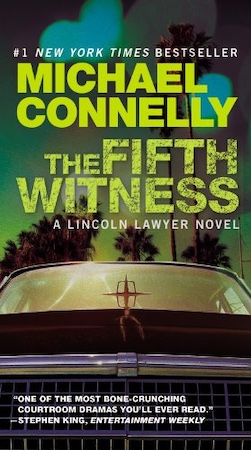Times are difficult for defense attorney Mickey Haller: the economy is on a downward slope and even criminals seem less inclined to spend money for an attorney, so Mickey is forced to turn toward the less prestigious but still lucrative field of foreclosure disputes. It might not be as glamorous, but exchanging quality for quantity helps in keeping up with the bills – that is, until something changes in the daily routine: his client Lisa Trammel, one of those battling with foreclosure, is charged with the murder of Mitchell Bondurant, the banker dealing with the reclamation of her home.
Ms. Trammel has become something of a public figure since she opened a website catering to people battling with foreclosure, and mounted several protests against Bondurant’s bank, becoming so obnoxious that a restrictive order has been issued against Lisa. Once the body of Bondurant is found in the bank’s parking lot, the police investigation turns immediately toward Trammel, even though she loudly claims her innocence. There is some circumstantial evidence against her, though, and Haller will need to deploy all of his legal wiles to keep his client from being sentenced as a murderer.
Michael Connelly is my go-to author when I look for a book I’m certain will not disappoint (even more so these days, as I find myself in something of a reading & blogging slump), and he’s also a very skilled writer who knows how to create narrative tension and keep it up all throughout the novel: The Fifth Witness is indeed that kind of book, dealing as it does with the cat-and-mouse play between prosecution and defense as Haller and his counterpart Andrea Freeman, a very determined, very competitive assistant district attorney, spare no tricks to win the battle. And indeed this story shows how a trial is less the search for the truth and more a clash of wills, a chess match where a stalemate is not contemplated, or desired. Haller himself does not care about the guilt or innocence of his clients – although in this case Lisa Trammel does look innocent – but rather cares about a courtroom victory, and the courtroom becomes the battleground where he and his adversary spare no punches to reach their goal.
There is an interesting comparison Haller makes, when speaking about his work, that aptly describes the story told in The Fifth Witness: he likens it to Ravel’s Bolero, which starts quietly with only one or two instruments playing, and slowly but surely gains intensity and moment as more instruments add their voice to the music, until the final crescendo is reached. That’s what happens with the trial – and the parallel investigation conducted by the defense – where the “instruments” Haller brings into play add to the “music” he performs for the jury, to win their hearts and minds in favor of his client.
A client who, despite her protestations of innocence, is as unpredictable and unsympathetic as they come, and in a couple of instances throws an unexpected curveball into the mix and seems to deliberately want to sabotage her own defense, particularly when she gives in to the seduction of notoriety and opens up to the ever-hungry media against her lawyer’s warnings. Haller’s clients, so far, have not been very likable characters but I have to admit that my antipathy for Trammel was immediate and unshakable, so that the story’s final twist, as surprising as it was, did not come as a complete shock.
When the novel does not deal with courtroom debate it focuses on the search for clues about an alternate perpetrator, and here Haller’s staff is portrayed with brief but enlightening touches that add to the story’s depth: from Cisco, the former biker turned skilled investigator, to Lorna, Haller’s second wife for a brief time who now works as his secretary, to Maggie, the lawyer’s first wife and dedicated prosecutor who still harbors some feelings for her ex-husband but cannot abide his methods. They are joined here by Mickey’s young associate, a recent graduate from law school still fueled by ideas of justice and rights: there are many moments in which we see her struggle with the demands of Haller’s practice and with the progressive loss of innocence caused by contact with the harsh reality of courtroom skirmishes.
And of course Mickey Haller’s personality gains a few more facets as the demands of the current trial see him divided between the duty of obtaining a victory for his client and the pull of his conscience: at some point he admits to not being very familiar with integrity, and he knows that’s what his clients need to win, but at the same time he wants the approval of Maggie and of their teenage daughter, he wants to feel worthy of them – and that might be the reason which pushes him, after the conclusion of the trial, to change sides and work as a prosecutor. It was a surprising choice, and it will prove to be both a career change and a change in outlook, and I wonder what this will mean for the next novel – or novels – in line.
What I am certain about is that no matter which field Haller decides to play in, the stories Michael Connelly will tell about him will continue to be as entertaining and compelling as the ones I read so far.














You must be logged in to post a comment.